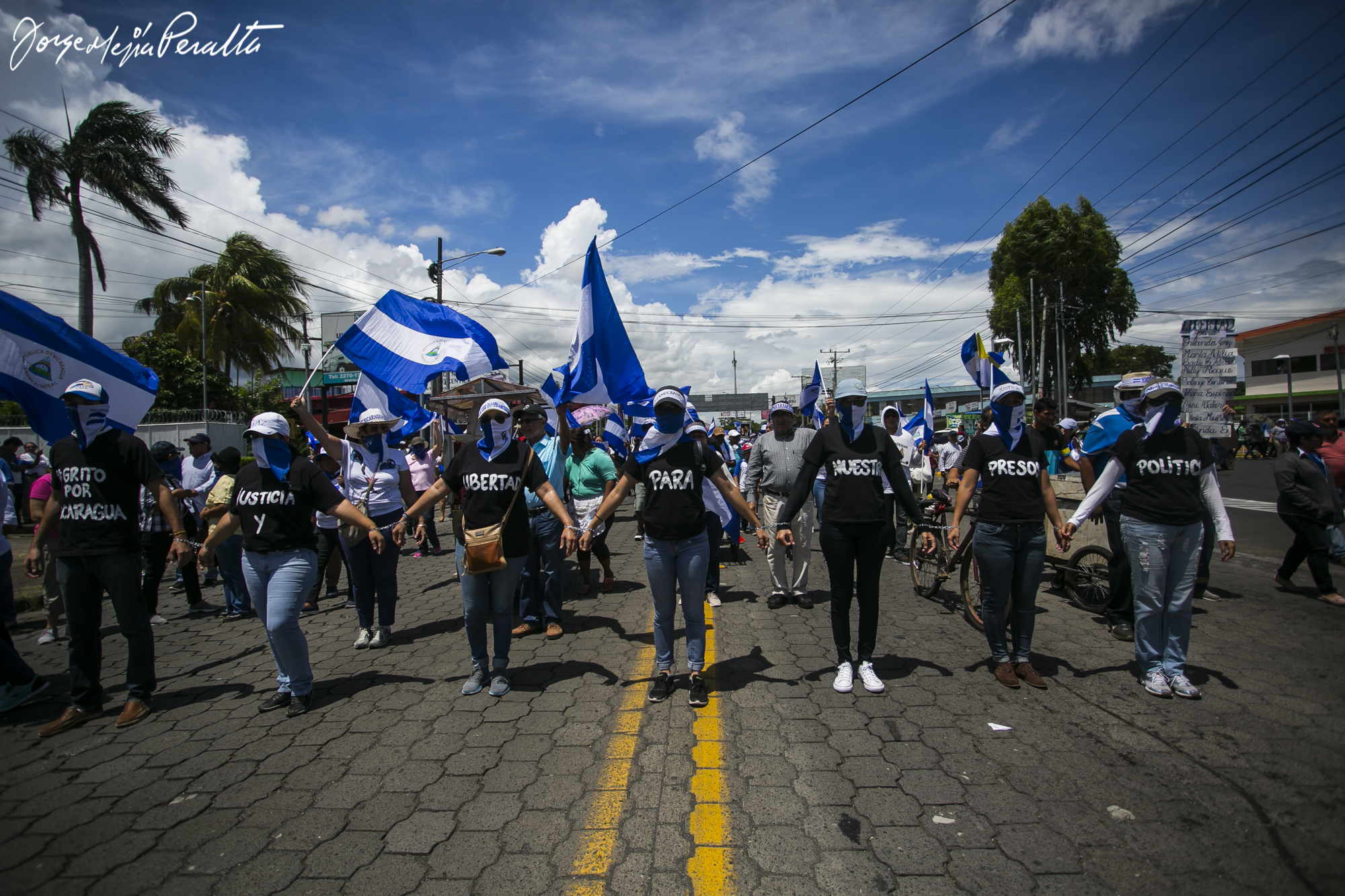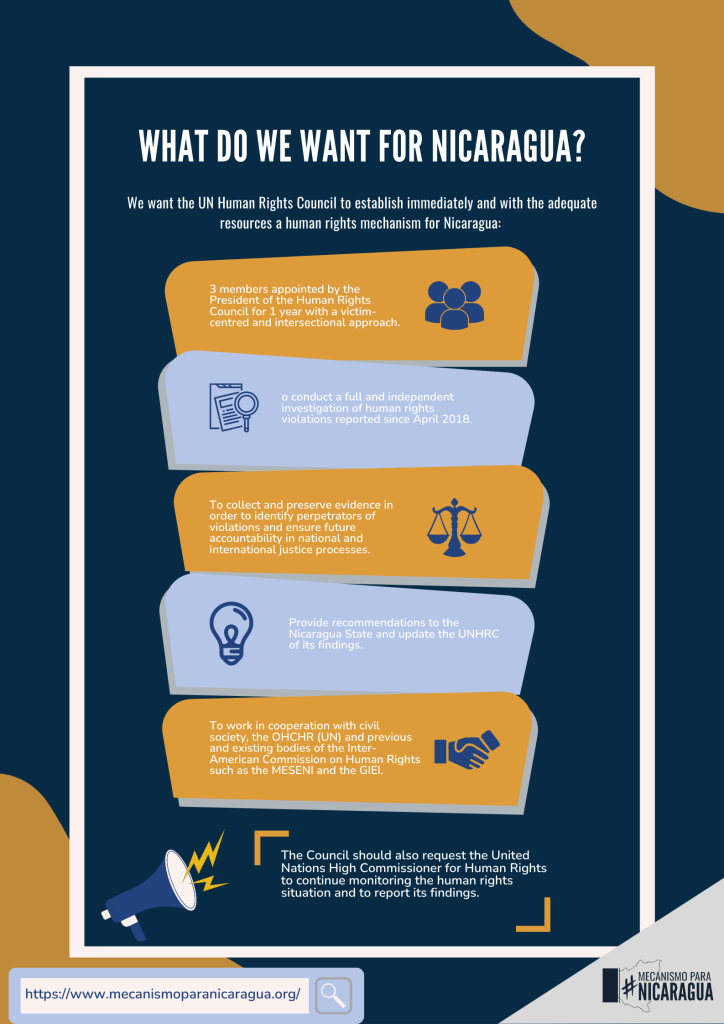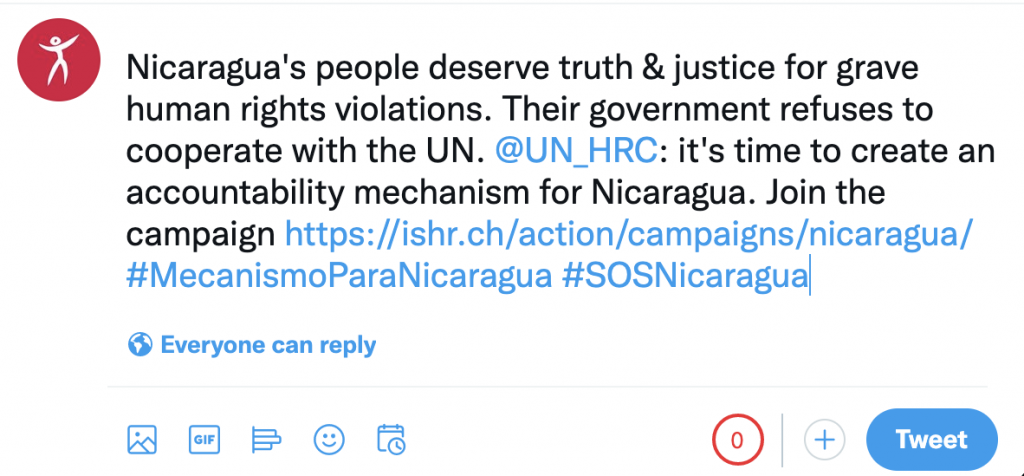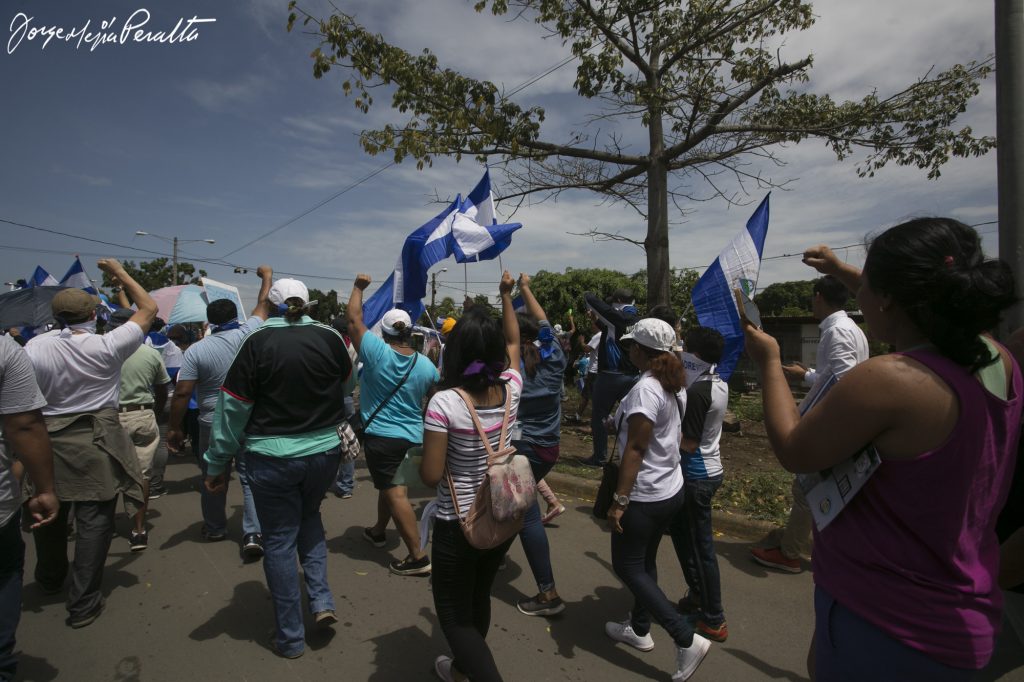Update: We did it!!! The UN Human Rights Council (HRC) adopted on 31 March 2022 during its 49th session, by 20 votes in favour, a resolution that establishes for one year a “Group of Experts on Human Rights” with a mandate to investigate and seek accountability for serious human rights violations in Nicaragua. The mechanism the Council adopted is one of the strongest in existence: it will make it possible to identify those responsible for the violations committed in Nicaragua and to preserve evidence for future justice processes. It sends a clear message to all States that non-cooperation with the universal system, and disregard for serious human rights violations, will not be tolerated.
Read more about this campaign win
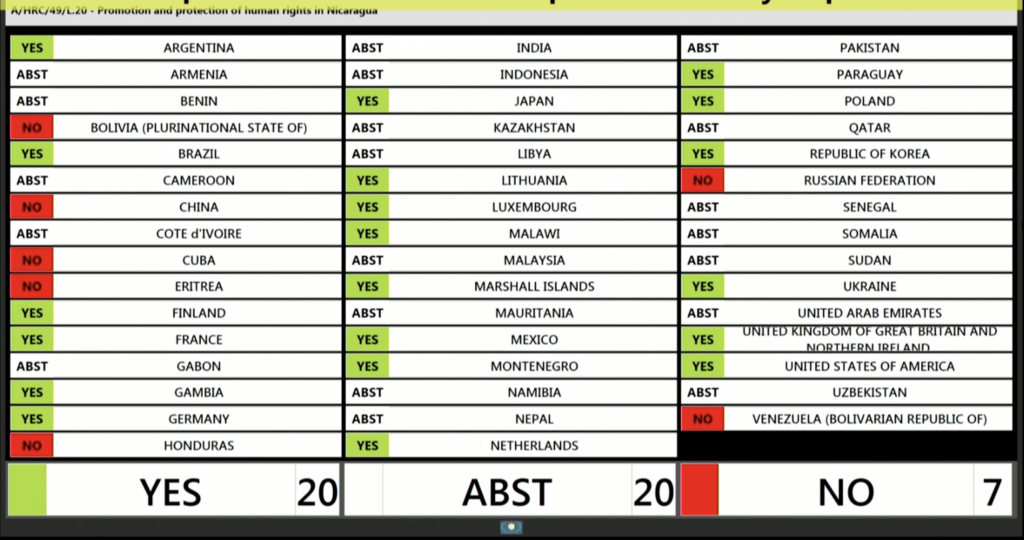
We believe in an open, equal, and democratic Nicaragua. A Nicaragua in which the human rights of all people are guaranteed without distinction, and where those who raise their voices against abuses are protected. A country in which truth and justice are guaranteed without exception, especially for those groups who have been historically discriminated against.
This is not currently possible in Nicaragua. Since April 2018, the government has criminalised, arbitrarily detained, tortured, disappeared, and even killed, those who promote human rights and who question the government’s way of governing, including indigenous and Afro-descendant peoples defending their ancestral territory. It has also adopted a series of laws restricting freedoms of expression, peaceful assembly and association, further closing space for civil society to push for positive change.
Recognising this crisis, the UN, through its Human Rights Council, has taken action by adopting resolution 46/2, calling on the Government of Nicaragua to adopt a series of urgent measures to resolve this multi-pronged human rights crisis. Yet, according to our research, the Government of Nicaragua has not implemented any of the recommendations of resolution 46/2. On the contrary, it has taken an increasing number of measures contrary to them.
Additionally, the Nicaraguan Government has showed no intention to resume meaningful cooperation with the international community, since it expelled the UN and Inter-American Commission on Human Rights (IACHR)’s human rights presence from the country in December 2018. During dedicated Human Rights Council meetings, it avoided addressing any substantial concern, instead rejecting all criticism as ‘interventionist and supremacist.’ It also refused to respond to questions posed by the Committee on Economic, Social, and Cultural Rights (CESCR) during its review last September.
It is time for the UN Human Rights Council to respond more assertively by establishing an international mechanism that ensures justice and accountability for Nicaragua, at its upcoming March 2022 session.
What do we want?
Resolution 46/2 was one of the last opportunities for Nicaragua’s Government to demonstrate its willingness to cooperate in good faith with the international community to find a solution to the human rights crisis in the country. As the Government did not take any significant steps to implement the international community’s recommendations, nor to cooperate with it, it is time for the UN to escalate its response, at the March 2022 session of the Human Rights Council.
We want the Human Rights Council to appoint a group of international, independent experts, to inquire into grave human rights violations since April 2018, as well as its root causes, with a view to holding perpetrators accountable in the future.
This should, in the long run, push the government of Nicaragua to respect the human rights of all Nicaraguan people. We want to see justice, truth, reparations and guarantees of non-repetition, for the victims of human rights abuses documented since April 2018. This includes the restoration of genuine rule of law, the recognition of the ancestral territories of indigenous and Afro-descendant peoples, as well as free, fair and transparent elections, and a participatory democracy, so that everyone in Nicaragua can live in peace, freedom, security and dignity.
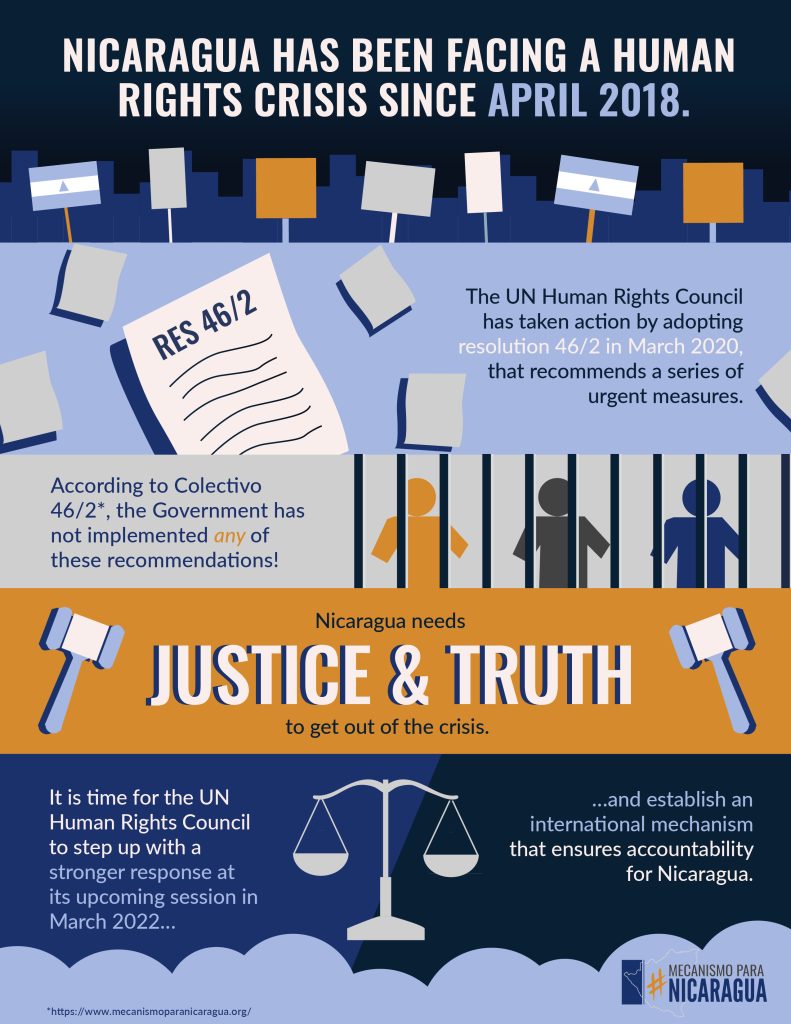
What should the international community do?
Given the scale and gravity of rights violations being committed, and the Government’s protracted lack of willingness to address the crisis nor to cooperate with the UN, it is time the UN – through its Human Rights Council – appoints a group of independent international experts to inquire into the situation. In its last paragraph, resolution 46/2 called on the Council to ‘consider all measures available to strengthen the promotion and protection of human rights in Nicaragua’ – a call since reiterated by High Commissioner Bachelet.
In this context, we launched during a press briefing on 4 November 2021 our global call for the UN Human Rights Council to establish an international accountability mechanism for Nicaragua, when it will consider renewing its annual resolution on Nicaragua at its upcoming March 2022 session.
This group of independent experts’ mandate must be based on the needs and recommendations from Nicaraguan civil society. It should be adequately staffed and resourced, and mandated to investigate grave human rights violations taking place since April 2018, as well as its root causes; and to collect and preserve evidence with a view to ensuring that perpetrators of violations or abuses of international human rights law are held accountable and can eventually be brought to justice in the future.
How do we achieve this?
-
- We conduct research, demonstrate that the Resolution 46/2 has not been implemented and that the UN should step up its response accordingly. Since the resolution’s adoption, we have sought to provide objective monitoring of government action – and inaction – to implement the resolution’s 14 recommendations. In August 2021, November 2021 and February 2022 we published our three Evaluation Benchmarks of Nicaragua’s implementation of resolution 46/2. These evaluations are based on publicly available information from the UN and Inter-American systems, as well as from civil society and independent journalism. Based on these assessments, we conclude that:
- The government of Nicaragua has taken no substantial, nor initial steps to implement any of the recommendations from resolution 46/2;
- The government has taken a significant number of actions contrary to the recommendations, resulting in a closed civil society space and an increase in attacks on human rights defenders, journalists, presidential candidates, and dissidents, over the last months.
- We conduct research, demonstrate that the Resolution 46/2 has not been implemented and that the UN should step up its response accordingly. Since the resolution’s adoption, we have sought to provide objective monitoring of government action – and inaction – to implement the resolution’s 14 recommendations. In August 2021, November 2021 and February 2022 we published our three Evaluation Benchmarks of Nicaragua’s implementation of resolution 46/2. These evaluations are based on publicly available information from the UN and Inter-American systems, as well as from civil society and independent journalism. Based on these assessments, we conclude that:
-
- We convince countries sitting at the UN Human Rights Council that an international accountability mechanism is necessary. We are advocating, meeting with and writing to Human Rights Council members and calling on them to support our call.
-
- We make sure our voice is heard out and loud. We speak with the media and make sure they replicate our calls and key messages. We also relay them on social media and with a larger group of civil society allies.
What can you do?
Nicaragua needs justice and truth to get out of this crisis and recover as a society. Share this campaign page and raise awareness with a journalist you know, your peers, or on social media, with the hashtags #MecanismoParaNicaragua and #SOSNicaragua. We have prepared a pre-made tweet to help you: click on the image below or copy-paste this link in your browser: https://ctt.ac/1Zee1

